-
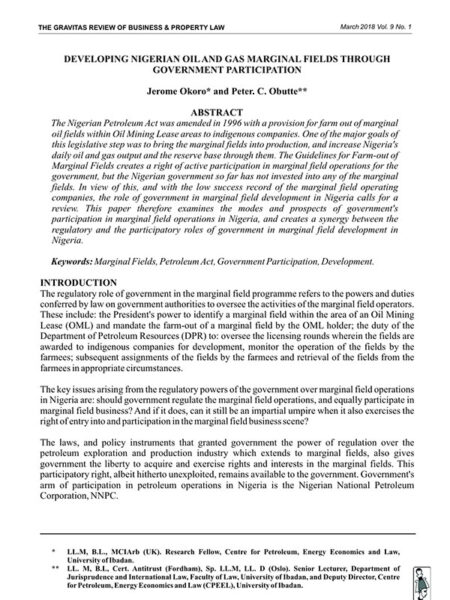
Developing Nigerian Oil and Gas Marginal Fields through Government Participation
0₦2,500.00Jerome Okoro and Dr. Peter Obutte, of the Centre for Petroleum, Energy Economics and Law, University of Ibadan in their article, “Developing Nigerian Oil and Gas Marginal Fields through Government Participation”, define what qualifies as a marginal field and note that the 1996 amendment to the Petroleum Act provides for farming out of marginal oil fields within Oil Mining Lease areas to indigenous companies. A major goal of the law was to bring the marginal fields into production, and increase Nigeria’s daily oil and gas output and the reserve base through them. Though the Guidelines for Farm-out of Marginal Fields creates a right of active participation in marginal field operations for the government, the Nigerian government so far has not invested into any of the marginal fields Okoro and Obutte undertake a review of the Nigerian marginal field development program, the legal basis of regulatory role of government, structure of Nigerian petroleum operations and expected reforms under the Petroleum Industry Governance Bill, 2017.
-
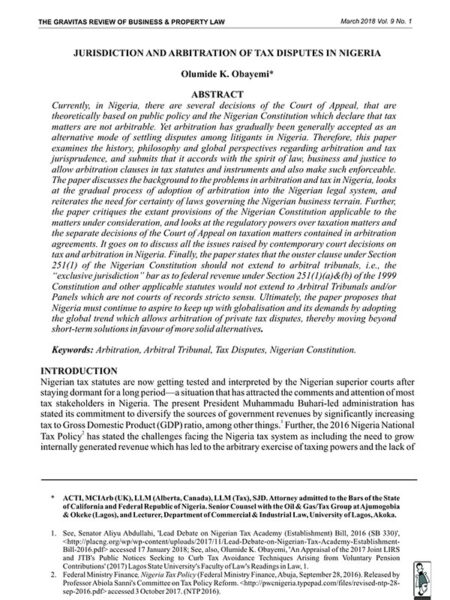
Jurisdiction and Arbitration of Tax Disputes in Nigeria
0₦2,500.00Dr. Olumide Obayemi, of the Department of Commercial & Industrial Law, University of Lagos, and of & Okeke, in his article, “Jurisdiction and Arbitration of Tax Disputes in Nigeria” observes that currently, based on public policy and the Constitution, tax matters are not arbitrable. He examines the history, philosophy and global perspectives regarding arbitration and tax jurisprudence, and submits that it accords with the spirit of law, business and justice to allow arbitration clauses in tax statutes. He reviews the decisions of the Court of Appeal on taxation matters contained in arbitration agreements, and submits that the exclusive jurisdiction conferred on the Federal High Court by Section 251(1)(a)&(b) of the 1999 Constitution should not bar arbitral tribunals which are not courts of records stricto sensu. He concludes that Nigeria must continue to aspire to keep up with and its demands by adopting the global trend which allows arbitration of private tax disputes.
-
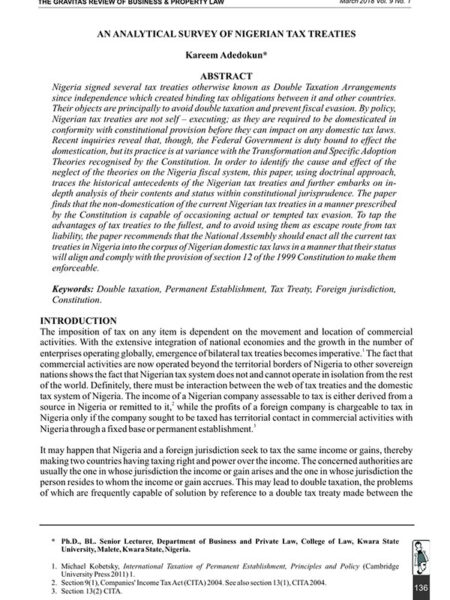
An Analytical Survey of Nigerian Tax Treaties
0₦2,500.00Dr. Kareem Adedokun, Senior Lecturer, Department of Business and Private Law, Kwara State University, in “An Analytical Survey of Nigerian Tax Treaties”,explains that Nigeria has since Independence, signed several tax treaties which created binding tax obligations between it and other countries. The objects of the treaties are principally to avoid double taxation and prevent fiscal evasion. He argues that the non-domestication of the tax treaties in a manner prescribed by the Constitution is capable of occasioning actual or tempted tax evasion. He recommends the domestication of the treaties to take full advantage of them, and to avoid them being used to escape tax liability.
-
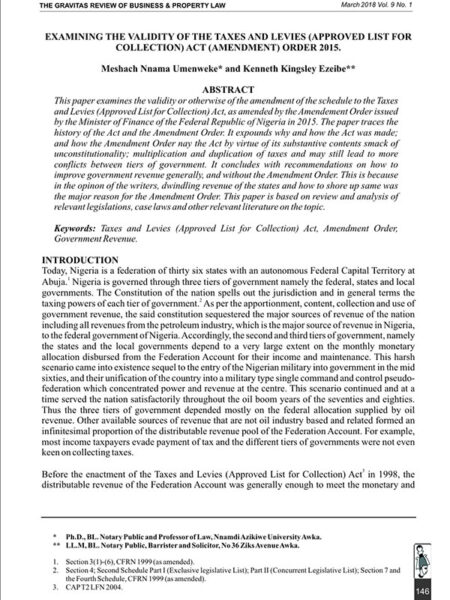
Examining the Validity of the Taxes and Levies (Approved List For Collection) Act (Amendment) Order 2015
0₦2,500.00Professor Meshach Umenweke of the Nnamdi Azikiwe University Awka, and Kenneth Ezeibe, legal practitioner, in their article “Examining the Validity of the Taxes and Levies (Approved List For Collection) Act (Amendment) Order 2015”, consider whether the Minister of Finance has the vires to amend the Schedule to the principal Act, and whether the items listed in the Order are consistent with the legislative and taxing powers of each tier of government under the Constitution.
-
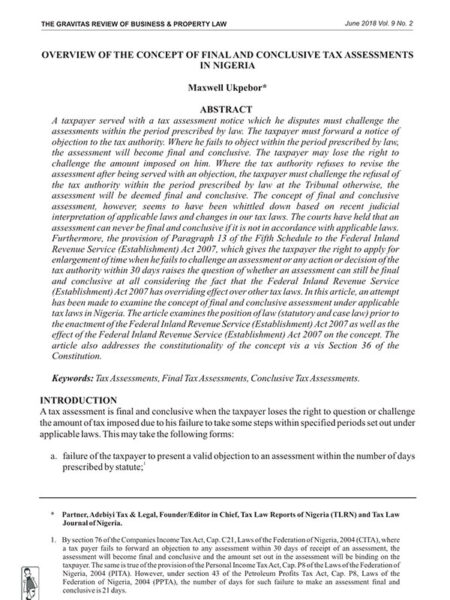
Overview of the Concept of Final and Conclusive Tax Assessments in Nigeria
0₦2,500.00Maxwell Ukpebor, Partner, Adebiyi Tax & Legal, and Editor-in-Chief of Tax Law Reports of Nigeria in his paper, Overview of the Concept of Final and Conclusive Tax Assessments, notes that a taxpayer served with a tax assessment which he disputes must challenge the assessment within the period prescribed by law otherwise the assessment becomes final and conclusive. He examines the constitutionality of the concept of final and conclusive tax assessment in Nigeria, the position of law (statutory and case law) prior to the enactment of the Federal Inland Revenue Service (Establishment) Act 2007, as well as the effect of the FIRS Act on the concept.
-
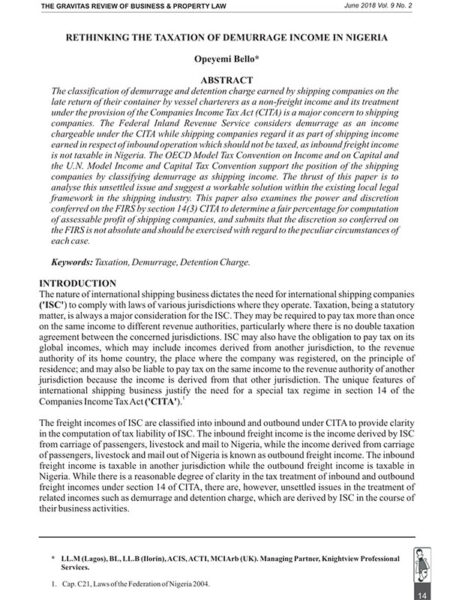
Rethinking the Taxation of Demurrage Income in Nigeria
0₦2,500.00Opeyemi Bello, Managing Partner, Knightview Professional Services in Rethinking the Taxation of Demurrage Income in Nigeria, observes that the classification of demurrage earned by shipping companies on the late return of their containers by charterers as a non-freight income, and its treatment under the provision of the Companies Income Tax Act (CITA) is a major concern to shipping companies; while the Federal Inland Revenue Service (FIRS) considers demurrage as an income chargeable under the CITA, the shipping companies regard it as part of shipping income earned in respect of inbound operation which is not taxable in Nigeria. Bello analyses this unsettled issue, and the discretion conferred on the FIRS by section 14(3) CITA to determine a fair percentage for computation of assessable profit of shipping companies, and suggests a workable solution within the existing legal framework.
-
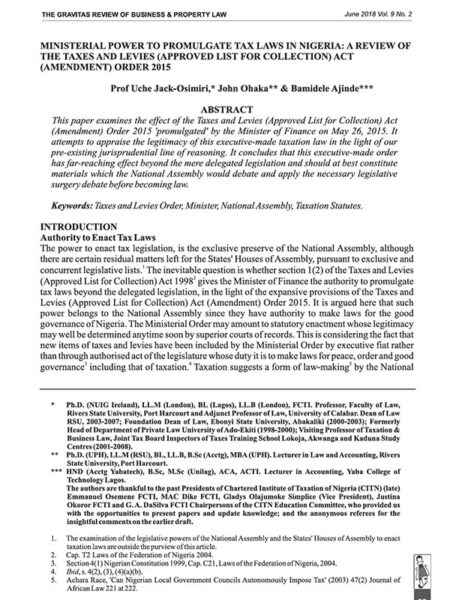
Ministerial Power to Promulgate Tax Laws in Nigeria: A Review of the Taxes and Levies (Approved List for Collection)Act (Amendment) Order 2015
0₦2,500.00Professor Uche Jack-Osimiri, John Ohaka and Bamidele Ajinde in their paper, Ministerial Power to Promulgate Tax Laws in Nigeria: A Review of the Taxes and Levies (Approved List for Collection) Act (Amendment) Order 2015 appraise the legitimacy of the Ministerial Order of 2015 in the light of pre-existing jurisprudential reasoning and case law. They posit that though section 1(2) of the Taxes and Levies (Approved List for Collection) Act 1998 provides that the Minister of Finance, may on the advice of the Joint Tax Board and by Order published in the Gazette, amend the Schedule to the Act, the Amendment Order of 2015 was shoddily done, lacks the necessary legislative rigour, and was most expansive as to belie the concept of delegated or subsidiary legislation.
-
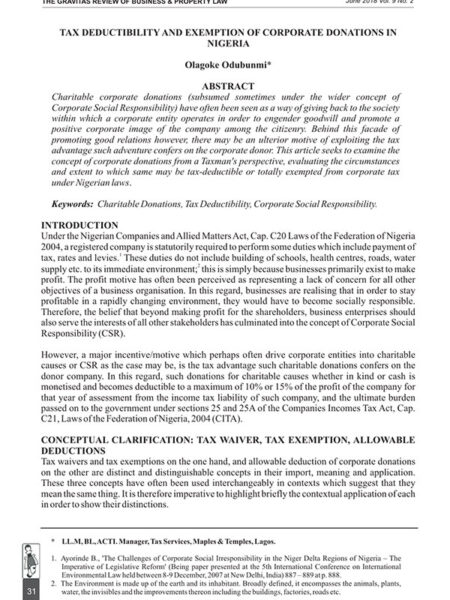
Tax Deductibility and Exemption of Corporate Donations in Nigeria
0₦2,500.00Olagoke Odubunmi, Manager, Tax Services, Maples & Temples, in his paper, Tax Deductibility and Exemption of Corporate Donations in Nigeria, notes that charitable corporate donations (subsumed sometimes under the wider concept of Corporate Social Responsibility) have often been seen as a way of giving back to the society within which a corporate entity operates in order to engender goodwill and promote a positive corporate image of the company among the citizenry. Behind this facade of promoting good relations however, there may be an ulterior motive of exploiting the tax advantage such adventure confers on the corporate donor. Odubunmi examines the legal framework for regulation of corporate donations in Nigeria. He explores the methods of making allowable and tax-deductible corporate donations, and use of charitable trusts as a vehicle for making corporate donations.
-
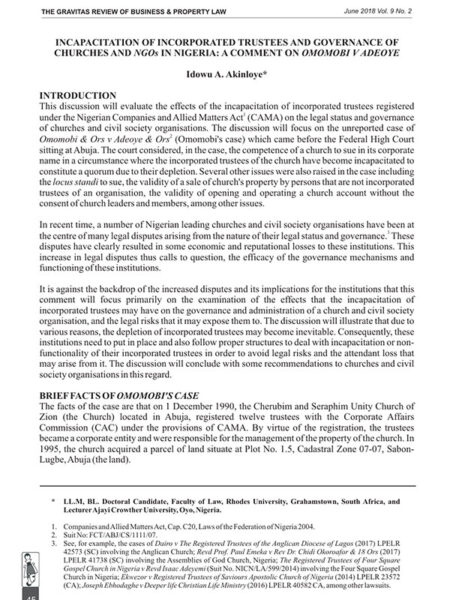
Incapacitation of Incorporated Trustees and Governance of Churches and NGOs in Nigeria: A Commentary of Omomobi v Adeoye
0₦2,500.00Idowu Akinloye, Lecturer Ajayi Crowther University, Oyo and Doctoral Candidate, Rhodes University, Grahamstown, South Africa in his article, Incapacitation of Incorporated Trustees and Governance of Churches and NGOs in Nigeria: A Commentary on Omomobi v Adeoye, examines how a church or civil society organisation may institute legal proceedings or otherwise function where the trustees are all dead, depleted or incapable of functioning.
-
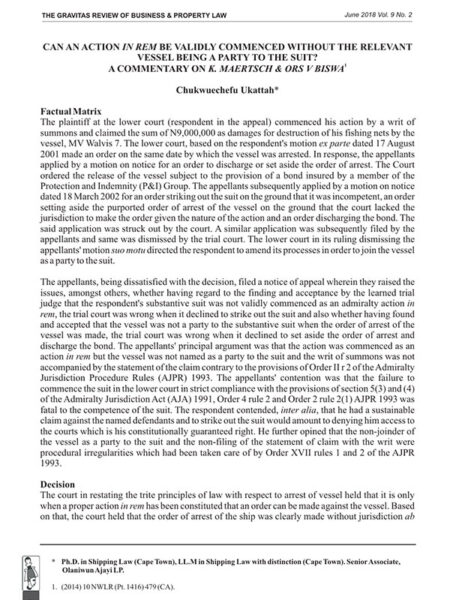
Can an Action In Rem be Validly Commenced Without the Relevant Vessel being A Party to the Suit? A Commentary on K. Maertsch & Ors v Biswa
0₦2,500.00Dr. Chukwuechefu Ukattah, Senior Associate, Olaniwun Ajayi LP asks a pertinent question in: Can an Action in Rem Be Validly Commenced Without The Relevant Vessel Being A Party To The Suit? A Commentary on K. Maertsch & Ors v Biswa. He reviews the decision of the Court of Appeal in the cited case, and using it as a background, explains the different types of admiralty actions and whether a proper action in rem can be constituted without the joinder of the vessel, and whether the non-joinder of the offending vessel in a suit for its arrest, is fatal to the action.
-
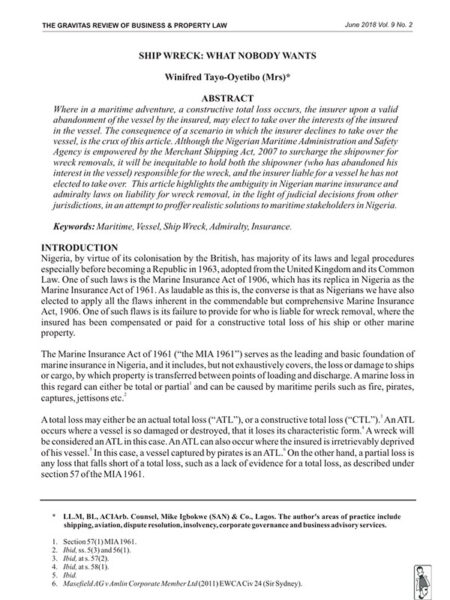
Ship Wreck: What Nobody Wants
0₦2,500.00Winifred Tayo-Oyetibo (Mrs) of Mike Igbokwe (SAN) & Co in her article, Ship Wreck: What Nobody Wants notes that where in a maritime adventure, a constructive total loss occurs, and the insurer having paid the shipowner declines to be saddled with the shipwreck, who then has the responsibility for its evacuation, removal or treatment? Tayo-Oyetibo in a masterly way argues that it will be inequitable to hold the shipowner who has abandoned his interest in the vessel responsible for the wreck, or the insurer who has elected not to take over, liable. She explores the provision of the Marine Insurance Act of 1961 and the 2007 highlighting the ambiguity in the Nigerian laws.
-
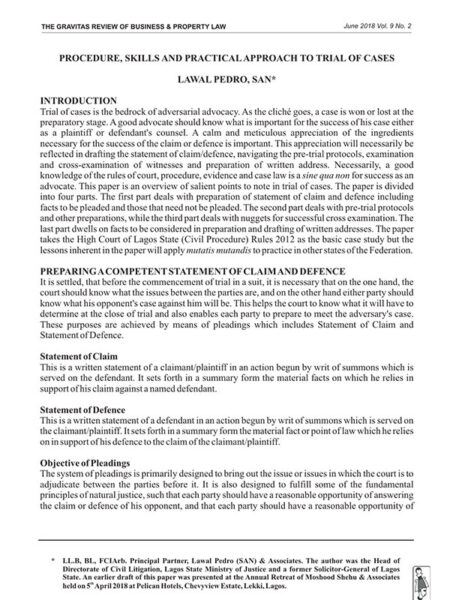
Procedure, Skills and Practical Approach to Trial of Cases
0₦2,500.00Lawal Pedro SAN, Principal Partner, Lawal Pedro (SAN) & Associates and former Solicitor-General of Lagos State in his article, Procedure, Skills and Practical Approach to Trial of Cases, notes that a good knowledge of the rules of court, procedure, evidence and case law is a sine qua non in trial of cases which is the bedrock of adversarial advocacy. Using case law as the framework and the High Court of Lagos State (Civil Procedure) Rules 2012 as the basic case study, he points out important elements in preparation of statement of claim/defence and pre-trial protocols. He gives nuggets for successful cross examination, and facts to consider in drafting good written addresses.
The Gravitas Review of Business & Property Law



